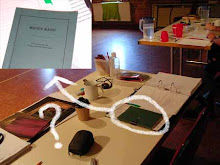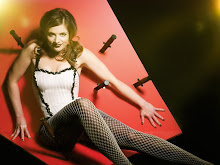
The preview period can be one of the most exciting periods for a new show. The show is close to being fully formed, yet it is also at a point where small changes can have very large effects on the piece.
Chris talks about the pleasure of feeling the audience's reactions to the piece. When you are intimately associated with a show your focus is on its improvement primarily. You forget the pleasures of the first readings and the first workshops. While you're in rehearsal you laugh at the jokes and delight in the offers the actors make that bring unexpected life or light to pieces of text, or silent moments. But, once you get into the final weeks, it is in improving the weaker moments that take up the biggest part of your time.
When people talk about the detail they find in the characterisation, and how they felt at certain electric moments, this can often re-invigorate these moments for the theatre-makers. They become new again through the experience they create in others.
The vibe at previews can vary significantly. Some people are there because they don't want to pay full price, some people are there because they like the unpredictability and extra 'live-ness' of previews, some are there because they have been given free tickets, some are there because it's the only night free in their schedules. It's a particular mix of people that is different from other audiences in the run. Chris addresses the audience for the first two previews to remind them that it's a preview and that work is still being done.
Indeed, every day the team works on the show before the night's preview. Chris generates a list of priorities for each rehearsal period before each show. The things he works on are broad issues in relation to the way the piece is being played. He identifies 'big picture' tweaks he wants to make to the show, then identifies all the specific moments in the piece that need detailing or shifting that will add up to generate the 'big picture' tweak that he has in mind.
It is a process of honing and refining. The discussion surrounds clarity, and what is serving the play. Now that the play is nearly fully formed, it is easier to tell what changes will serve the whole. This process engages a lot of different types of changes. Pieces of scenes are cut, lines are added to clarify moments, staging is switched to highlight something in particular. A myriad of different changes are made to shape the work towards opening night.
Some of the changes feel big, like cutting half a scene. Others feel smaller, like bringing a scene further upstage, or re-rehearsing a scene with a particular thought higher in mind. But, from a certain perspective, all of these changes are 'small' because they are all about clarifying, rather than generating anything new. However, as I said at the top, though each change might be small, their effect on the work can be highly significant.
Today's rehearsal is reasonably relaxed. The tension that accompanied the first preview has dissipated, and the company is building its confidence heading towards opening. If anything, there's a slightly weird atmosphere to the rehearsal. The cast break into unusual accents from time to time for no reason. People are murmuring refrains from the songs, odd connections are being made between lines, and people bring up random tangential references as they talk. It's not a lack of focus; when people are supposed to be 'on,' they are. It's just a slightly strange atmosphere that takes hold of the room. Perhaps it's reflective of the slightly 'no-mans land' place they are in at the moment; the play has played three times before an audience, but it hasn't opened; the routine is similar to the energy of being mid-run, yet it is still being rehearsed and modified daily. It's an 'in-between' state that most shows don't even get, seeing as most shows don't get to play four previews before they open.
Tonight's preview is the fourth and final. Tomorrow night is the opening. Somebody asked me in a comment last week whether the show would change a lot across the previews. The simple answer is that it has already changed a lot across the first three. Perhaps the more interesting question is what has changed, or how has it changed across the previews. Because no a great deal has been added. At its essence, the great majority of what has 'changed' was actually already there.
But through the bringing of aspects of the play to the fore and the pushing of other aspects back, the play is experienced differently, and yes, it is changing in important ways. I will try to get an opportunity to speak to Chris about how he understands the change in the piece in the final few days of the process. In some ways, especially when it's a new play, this feels like a separate process in itself.
Chris talks about the pleasure of feeling the audience's reactions to the piece. When you are intimately associated with a show your focus is on its improvement primarily. You forget the pleasures of the first readings and the first workshops. While you're in rehearsal you laugh at the jokes and delight in the offers the actors make that bring unexpected life or light to pieces of text, or silent moments. But, once you get into the final weeks, it is in improving the weaker moments that take up the biggest part of your time.
When people talk about the detail they find in the characterisation, and how they felt at certain electric moments, this can often re-invigorate these moments for the theatre-makers. They become new again through the experience they create in others.
The vibe at previews can vary significantly. Some people are there because they don't want to pay full price, some people are there because they like the unpredictability and extra 'live-ness' of previews, some are there because they have been given free tickets, some are there because it's the only night free in their schedules. It's a particular mix of people that is different from other audiences in the run. Chris addresses the audience for the first two previews to remind them that it's a preview and that work is still being done.
Indeed, every day the team works on the show before the night's preview. Chris generates a list of priorities for each rehearsal period before each show. The things he works on are broad issues in relation to the way the piece is being played. He identifies 'big picture' tweaks he wants to make to the show, then identifies all the specific moments in the piece that need detailing or shifting that will add up to generate the 'big picture' tweak that he has in mind.
It is a process of honing and refining. The discussion surrounds clarity, and what is serving the play. Now that the play is nearly fully formed, it is easier to tell what changes will serve the whole. This process engages a lot of different types of changes. Pieces of scenes are cut, lines are added to clarify moments, staging is switched to highlight something in particular. A myriad of different changes are made to shape the work towards opening night.
Some of the changes feel big, like cutting half a scene. Others feel smaller, like bringing a scene further upstage, or re-rehearsing a scene with a particular thought higher in mind. But, from a certain perspective, all of these changes are 'small' because they are all about clarifying, rather than generating anything new. However, as I said at the top, though each change might be small, their effect on the work can be highly significant.
Today's rehearsal is reasonably relaxed. The tension that accompanied the first preview has dissipated, and the company is building its confidence heading towards opening. If anything, there's a slightly weird atmosphere to the rehearsal. The cast break into unusual accents from time to time for no reason. People are murmuring refrains from the songs, odd connections are being made between lines, and people bring up random tangential references as they talk. It's not a lack of focus; when people are supposed to be 'on,' they are. It's just a slightly strange atmosphere that takes hold of the room. Perhaps it's reflective of the slightly 'no-mans land' place they are in at the moment; the play has played three times before an audience, but it hasn't opened; the routine is similar to the energy of being mid-run, yet it is still being rehearsed and modified daily. It's an 'in-between' state that most shows don't even get, seeing as most shows don't get to play four previews before they open.
Tonight's preview is the fourth and final. Tomorrow night is the opening. Somebody asked me in a comment last week whether the show would change a lot across the previews. The simple answer is that it has already changed a lot across the first three. Perhaps the more interesting question is what has changed, or how has it changed across the previews. Because no a great deal has been added. At its essence, the great majority of what has 'changed' was actually already there.
But through the bringing of aspects of the play to the fore and the pushing of other aspects back, the play is experienced differently, and yes, it is changing in important ways. I will try to get an opportunity to speak to Chris about how he understands the change in the piece in the final few days of the process. In some ways, especially when it's a new play, this feels like a separate process in itself.




No comments:
Post a Comment